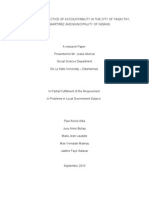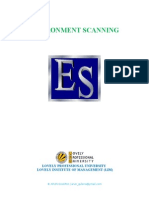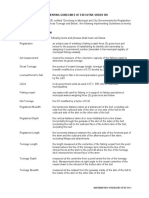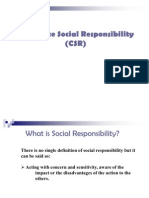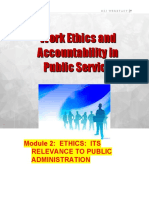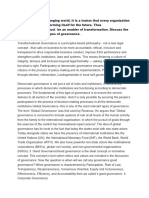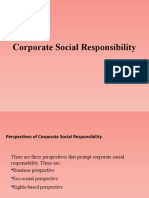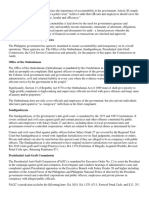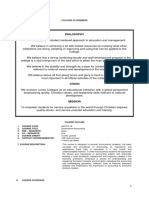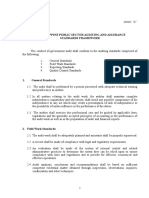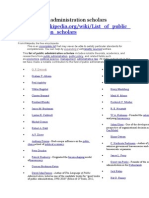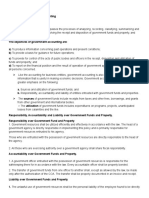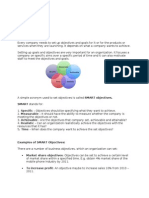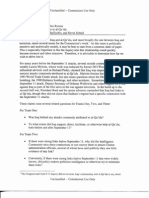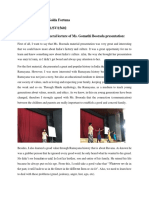0%(1)0% found this document useful (1 vote)
360 viewsAdmin. Accountability Powerpoint
Admin. Accountability Powerpoint
Uploaded by
Chatleen Pagulayan TumanguilAdministrative accountability refers to the process by which public agencies and civil servants are evaluated on their performance, financial management, and use of discretion. It involves being answerable to stakeholders for actions and results. Accountability requires proper accounting practices and evaluation systems. There are various types of accountability including political (to the public and legislature), administrative (to internal rules and superiors), ethical (improving conduct), and managerial. Key principles are that one can only delegate as much authority as they possess and is responsible for tasks being performed properly.
Copyright:
© All Rights Reserved
Available Formats
Download as PPTX, PDF, TXT or read online from Scribd
Admin. Accountability Powerpoint
Admin. Accountability Powerpoint
Uploaded by
Chatleen Pagulayan Tumanguil0%(1)0% found this document useful (1 vote)
360 views12 pagesAdministrative accountability refers to the process by which public agencies and civil servants are evaluated on their performance, financial management, and use of discretion. It involves being answerable to stakeholders for actions and results. Accountability requires proper accounting practices and evaluation systems. There are various types of accountability including political (to the public and legislature), administrative (to internal rules and superiors), ethical (improving conduct), and managerial. Key principles are that one can only delegate as much authority as they possess and is responsible for tasks being performed properly.
Original Description:
DOCS
Copyright
© © All Rights Reserved
Available Formats
PPTX, PDF, TXT or read online from Scribd
Share this document
Did you find this document useful?
Is this content inappropriate?
Administrative accountability refers to the process by which public agencies and civil servants are evaluated on their performance, financial management, and use of discretion. It involves being answerable to stakeholders for actions and results. Accountability requires proper accounting practices and evaluation systems. There are various types of accountability including political (to the public and legislature), administrative (to internal rules and superiors), ethical (improving conduct), and managerial. Key principles are that one can only delegate as much authority as they possess and is responsible for tasks being performed properly.
Copyright:
© All Rights Reserved
Available Formats
Download as PPTX, PDF, TXT or read online from Scribd
Download as pptx, pdf, or txt
0%(1)0% found this document useful (1 vote)
360 views12 pagesAdmin. Accountability Powerpoint
Admin. Accountability Powerpoint
Uploaded by
Chatleen Pagulayan TumanguilAdministrative accountability refers to the process by which public agencies and civil servants are evaluated on their performance, financial management, and use of discretion. It involves being answerable to stakeholders for actions and results. Accountability requires proper accounting practices and evaluation systems. There are various types of accountability including political (to the public and legislature), administrative (to internal rules and superiors), ethical (improving conduct), and managerial. Key principles are that one can only delegate as much authority as they possess and is responsible for tasks being performed properly.
Copyright:
© All Rights Reserved
Available Formats
Download as PPTX, PDF, TXT or read online from Scribd
Download as pptx, pdf, or txt
You are on page 1of 12
ADMINISTRATIVE ACCOUNTABILITY
Accountability is defined as the process in which public
agencies and civil servants operating inside the public
administration answer to the public, directly or through the
parliament, for public policy, financial management
and administrative discretion
is an assurance that an individual or an organization will be
evaluated on their performance or behavior related to
something for which they are responsible. ...
Corporate accountability involves being answerable to all
an organization's stakeholders for all actions and results.
In governance, accountability has expanded beyond the basic
definition of "being called to account for one's actions". It is
frequently described as an account-giving relationship
between individuals, e.g. "A is accountable to B when A is
obliged to inform B about A's (past or future) actions and
decisions, to justify them, and to suffer punishment in the
case of eventual misconduct".]Accountability cannot exist
without proper accounting practices; in other words, an
absence of accounting means an absence of accountability.
History and etymology
Accountability" stems from late
Latin accomptare (to account), a prefixed form
of computare (to calculate), which in turn derived
from putare (to reckon).While the word itself
does not appear in English until its use in 13th
century Norman England,the concept of account-
giving has ancient roots in record keeping
activities related to governance and money-
lending systems that first developed in Ancient .
Types of Admin. Accountability
Bruce Stone, O.P. Dwivedi, and Joseph G.
Jabbra list 8 types of accountability, namely:
moral, administrative, political, managerial,
market, legal/judicial, constituency
relation, and professional and Leadership
accountability.
Political accountability is the accountability
of the government, civil
servants and politicians to the public and to
legislative bodies such as a congress or
a parliament.
Ethical
Within an organization, the principles and
practices of ethical accountability aim to
improve both the internal standard of
individual and group conduct as well as
external factors, such as sustainable
economic and ecologic strategies.
Administrative
Internal rules and norms as well as some
independent commission are mechanisms to hold
civil servants within the administration of
government accountable. Within department or
ministry, firstly, behavior is bound by rules and
regulations; secondly, civil servants are
subordinates in a hierarchy and accountable to
superiors.
Principles of Accountability
A person cannot delegate greater authority,
responsibility, and accountability than they have.
A person delegating taks is responsible for ensureing
those tasks are being performed properly. ...
Each Administrative Official is responsible for
monitoring the effectiveness of the accountability
structure.
Administrative Accountability
Administrative officials must develop an
appropriate structure for effectively
handling university resources. This may
involve delegating some tasks to employees
within the unit or department. This page
clarifies those areas that cannot be re-
delegated to others.
Compliance with all applicable laws and regulations, university
policies, and collective bargaining agreements, and with the terms
and conditions of gifts, contracts, and grants
Maintenance of a sound financial condition and good business
practices for the department or business unit
Establishment of an effective system of internal controls consistent
with the UCSD Principles of Accountability and Regulatory
Compliance
Adherence to ethical business standards
Administration of human resource activities in a manner that
fosters diversity in the workforce and ensures due process
Ensuring appropriate access to, and use of, university information
and systems, including the integrity of data and transactions
entered or modified by staff in their area of responsibility
Protecting university assets, including the proper use and
disposition of personal and sensitive information
TYPES
Political. ...
Ethical. ...
Administrative. ...
Security. ...
Individuals within organizations. ...
Constituency relations. ...
Public/private overlap. ...
Accountability in education.
You might also like
- Celebrity Endorsements: A Literature Review and Research AgendaDocument23 pagesCelebrity Endorsements: A Literature Review and Research AgendaHanno PoeschlNo ratings yet
- Best of The Jail Report 2011Document28 pagesBest of The Jail Report 2011Greg RickabaughNo ratings yet
- Mechanism and Practice of Accountability in The City of Tagaytay, Trece Martirez and Municipality of IndangDocument17 pagesMechanism and Practice of Accountability in The City of Tagaytay, Trece Martirez and Municipality of IndangJastine Salazar100% (1)
- Hierarchy Weber and The Old ModelDocument24 pagesHierarchy Weber and The Old ModelDragos XpeNo ratings yet
- Galing Pook Awards 2018 Application FormDocument5 pagesGaling Pook Awards 2018 Application FormEnrico_LariosNo ratings yet
- Keeping Up With Influencers Exploring The Impact of Social Presence and Parasocial Interactions On Instagram 2Document22 pagesKeeping Up With Influencers Exploring The Impact of Social Presence and Parasocial Interactions On Instagram 2Ivana ErcegovacNo ratings yet
- Bovens Public Accountability - Connex2Document35 pagesBovens Public Accountability - Connex2NazLubna100% (1)
- Reflection AssignmentDocument2 pagesReflection Assignmentapi-550027025No ratings yet
- Environment ScanningDocument29 pagesEnvironment ScanningArun GuleriaNo ratings yet
- Module 1 - Overview of Government AccountingDocument5 pagesModule 1 - Overview of Government AccountingJebong CaguitlaNo ratings yet
- Case Study & ReflectionDocument4 pagesCase Study & ReflectionBernadette Ruth MasuliNo ratings yet
- Ethical Dilemmas & Social Responsibility IssuesDocument3 pagesEthical Dilemmas & Social Responsibility IssuesHector LambertNo ratings yet
- Cba Lecture - HRMDocument23 pagesCba Lecture - HRMVanessa ManaladNo ratings yet
- MPA 605 Comprehensive ExamDocument5 pagesMPA 605 Comprehensive Examlawrencelerio.pagibigNo ratings yet
- Q1. Discuss The Features, Functions and Dysfuntion of BureaucracyDocument11 pagesQ1. Discuss The Features, Functions and Dysfuntion of BureaucracyAkhil Singh GangwarNo ratings yet
- Module 4 - Public Fiscal AdministrationDocument10 pagesModule 4 - Public Fiscal AdministrationAngel BNo ratings yet
- Implementing Guidelines EO 305Document6 pagesImplementing Guidelines EO 305Brian TomasNo ratings yet
- Unit 3 Corporate Social ResponsibilityDocument76 pagesUnit 3 Corporate Social ResponsibilitySurender SinghNo ratings yet
- The Father of Scientific ManagementDocument35 pagesThe Father of Scientific ManagementsatkaurchaggarNo ratings yet
- Auditing Fundamentals Unit 1 Meaning of Auditing: Financial StatementsDocument14 pagesAuditing Fundamentals Unit 1 Meaning of Auditing: Financial StatementsNandhakumarNo ratings yet
- Accounting For Corporations REDocument15 pagesAccounting For Corporations RENichole Balao-asNo ratings yet
- DILG MC 2014-39 Seal of Good Local Governance Mar 24 2014Document13 pagesDILG MC 2014-39 Seal of Good Local Governance Mar 24 2014joreyvilNo ratings yet
- SOCIAL System and Organizational CultureDocument7 pagesSOCIAL System and Organizational CultureRenn TalensNo ratings yet
- Ombudsman Report BiranDocument31 pagesOmbudsman Report BiranAnthony Panganiban100% (1)
- Module 2 - Ethics - Its Relevance To Public AdministrationDocument12 pagesModule 2 - Ethics - Its Relevance To Public AdministrationMaria Jasmin LoyolaNo ratings yet
- Business EthicsDocument10 pagesBusiness EthicsGlen Mark FortunNo ratings yet
- What Is Public PolicyDocument12 pagesWhat Is Public Policykaiser2cuNo ratings yet
- State AccountingDocument4 pagesState AccountingLeah Moreno100% (1)
- Pa 1 ReviewerDocument13 pagesPa 1 Reviewershany davidNo ratings yet
- Pa 241 Introduction To Public Fiscal Administration: Dr. Luzviminda G. Manangan - Ozarraga ProfessorDocument40 pagesPa 241 Introduction To Public Fiscal Administration: Dr. Luzviminda G. Manangan - Ozarraga ProfessorMomoNo ratings yet
- Administrative DiscretionDocument14 pagesAdministrative DiscretionadvocaterraviNo ratings yet
- Transformational GovernmentDocument14 pagesTransformational GovernmentLester Jao Seguban100% (1)
- Government Auditing Lesson 1 1Document8 pagesGovernment Auditing Lesson 1 1Aubrey Jean ZantuaNo ratings yet
- Corporate Social ResponsibilityDocument31 pagesCorporate Social ResponsibilityYash MittalNo ratings yet
- JAIBB SyllabusDocument5 pagesJAIBB Syllabusmuhit jishanNo ratings yet
- SEC Vs Interport Resources CorpDocument16 pagesSEC Vs Interport Resources CorpDee WhyNo ratings yet
- Government Accountability AgenciesDocument3 pagesGovernment Accountability AgenciesMeane Balbontin100% (1)
- ACCTG 16 (Government Accounting) COURSE OUTLINEDocument3 pagesACCTG 16 (Government Accounting) COURSE OUTLINEHazelline DomingoNo ratings yet
- Controlling: Strategic Control Systems Identifying Control ProblemsDocument12 pagesControlling: Strategic Control Systems Identifying Control ProblemsPaul Ocampo100% (1)
- Special Economic Zones and Local GovernanceDocument33 pagesSpecial Economic Zones and Local Governancecluadine dinerosNo ratings yet
- The Philippine Public Sector Auditing and Assurance Standards FrameworkDocument3 pagesThe Philippine Public Sector Auditing and Assurance Standards Frameworksunsetsailor85100% (1)
- List of Public Administration ScholarsDocument3 pagesList of Public Administration ScholarsSubhash Pandey100% (1)
- Budget Reform BillDocument3 pagesBudget Reform BillMark Joseph BajaNo ratings yet
- PA 208 Report - Public Personnel Admin and EODBDocument23 pagesPA 208 Report - Public Personnel Admin and EODBGlyzel SaplaNo ratings yet
- Government Budgeting PPBS To Performance-Based BudgetingDocument3 pagesGovernment Budgeting PPBS To Performance-Based BudgetingChong BianzNo ratings yet
- Fiscal AdministrationDocument34 pagesFiscal AdministrationRaymond Besorio GadaisNo ratings yet
- Rules and Regulations On The Granting, UtilizationDocument5 pagesRules and Regulations On The Granting, UtilizationJesse JamesNo ratings yet
- Government AccountingDocument13 pagesGovernment AccountingReniella Villondo100% (1)
- Relationship Between Organisations and Information SystemsDocument16 pagesRelationship Between Organisations and Information SystemsJoan KuriaNo ratings yet
- The Proverbs of AdministrationDocument5 pagesThe Proverbs of AdministrationAnn Quibedo Tagayuna Caga-ananNo ratings yet
- Overview of Government Accounting: Topic 1Document18 pagesOverview of Government Accounting: Topic 1Cherrie Arianne Fhaye Naraja100% (1)
- Ruben G. Tecson: Independent Auditor'S ReportDocument5 pagesRuben G. Tecson: Independent Auditor'S Reportfranchesca marie t. uyNo ratings yet
- Republic Act No. 6713 Section 8. Statements and Disclosure. - Public Officials and Employees Have An Obligation To Accomplish and SubmitDocument3 pagesRepublic Act No. 6713 Section 8. Statements and Disclosure. - Public Officials and Employees Have An Obligation To Accomplish and SubmitAlisa WadeNo ratings yet
- National Water & Air Pollution Control Commission Act (RA 3931)Document13 pagesNational Water & Air Pollution Control Commission Act (RA 3931)Nylinad Etnerfacir ObmilNo ratings yet
- MGMT 6010 Comprehensive Exam Questions AY 2022-2023Document1 pageMGMT 6010 Comprehensive Exam Questions AY 2022-2023Mary Jane Rodriguez100% (1)
- Good Governance & Social Responsibility: 1. What Is Good Corporate Governance?Document5 pagesGood Governance & Social Responsibility: 1. What Is Good Corporate Governance?BeaNo ratings yet
- Ethics in Public Administration-5Document19 pagesEthics in Public Administration-5Alyan Naveed100% (1)
- Chapter 7 AccountabilityDocument21 pagesChapter 7 AccountabilityXvia98No ratings yet
- Accountability and ResponsibilityDocument12 pagesAccountability and ResponsibilitySURAJ SINGH VAISHNo ratings yet
- Accountability For Good GovernanceDocument6 pagesAccountability For Good GovernanceFarasat Ayoub BalochNo ratings yet
- AccountabilityDocument4 pagesAccountabilityshahNo ratings yet
- Pa113 Public Accountability - LectureDocument43 pagesPa113 Public Accountability - LectureDennisGomez100% (1)
- Agile Task Order ExampleDocument30 pagesAgile Task Order Exampleرهف عبد اللهNo ratings yet
- Smart Obj. Kiss and SwotDocument5 pagesSmart Obj. Kiss and SwotjtopuNo ratings yet
- John's ResumeDocument2 pagesJohn's ResumecamjolewasNo ratings yet
- Annotated Bibliography WilsonDocument4 pagesAnnotated Bibliography Wilsonapi-329778251No ratings yet
- Arts AppreciationDocument44 pagesArts AppreciationChennie Mae Pionan SorianoNo ratings yet
- Full Name "Close Reading": Bensekrane HabibDocument2 pagesFull Name "Close Reading": Bensekrane HabibhabibNo ratings yet
- Small TalkDocument2 pagesSmall Talkhipsipila10No ratings yet
- ACMSERV Reflection PaperDocument1 pageACMSERV Reflection PaperSamantha SantosNo ratings yet
- Organization Theory and Design Lecture - 3Document15 pagesOrganization Theory and Design Lecture - 3mohamed issamNo ratings yet
- T2 B5 Iraq Issues FDR - Memo - Assessing Iraq - Al Qaeda Links 614Document2 pagesT2 B5 Iraq Issues FDR - Memo - Assessing Iraq - Al Qaeda Links 6149/11 Document ArchiveNo ratings yet
- OCEANARIUM SynopsisDocument7 pagesOCEANARIUM SynopsisshubhamNo ratings yet
- SWOT & STP Analysis of Bourbon BiscuitsDocument5 pagesSWOT & STP Analysis of Bourbon BiscuitsAnonymous L0hmdWZuJtNo ratings yet
- Ten Components of A Good Ad LayoutDocument1 pageTen Components of A Good Ad LayoutMihaela StamboliyskaNo ratings yet
- Concept PaperDocument3 pagesConcept PaperGi Al75% (8)
- Audioscripts: Listening Part 1Document9 pagesAudioscripts: Listening Part 1dawidh78No ratings yet
- Kibera Primary School Proposal September 2013Document6 pagesKibera Primary School Proposal September 2013Vivek MishraNo ratings yet
- Role of Professional Associations and Unions GauriDocument18 pagesRole of Professional Associations and Unions GauriArchu Sharma78% (9)
- Staff Report On Applicant List For Marijuana Commerce in Unincorporated Riverside CountyDocument5 pagesStaff Report On Applicant List For Marijuana Commerce in Unincorporated Riverside CountyThe Press-Enterprise / pressenterprise.comNo ratings yet
- Ccu 1Document4 pagesCcu 1amelia goldaNo ratings yet
- Fobn 10-22 Ec155b1 Apm2000 RN0 30-06-2017Document132 pagesFobn 10-22 Ec155b1 Apm2000 RN0 30-06-2017秦伟涛No ratings yet
- A Recognition Awards For Sustainable & Eco-Friendly SchoolsDocument4 pagesA Recognition Awards For Sustainable & Eco-Friendly SchoolsGavinKarl MianabanataoNo ratings yet
- Low Cost MarketingDocument20 pagesLow Cost MarketingCauvery C HydNo ratings yet
- Military Review-May June 2020Document148 pagesMilitary Review-May June 2020C G0% (1)
- TQM LeadershipDocument14 pagesTQM LeadershipmalikdadbalochNo ratings yet
- SMAW Learning Modules For Grade 10Document119 pagesSMAW Learning Modules For Grade 10Joey Floremea Mondelo100% (1)
- Therapeutic Communication in Nursing Practice: Presented By: K. Hutchinson RN, BSNDocument9 pagesTherapeutic Communication in Nursing Practice: Presented By: K. Hutchinson RN, BSNKaren HutchinsonNo ratings yet
- Preface: Brigade Tactics (2012) and Part 2 Battlegroup Tactics (2014)Document1 pagePreface: Brigade Tactics (2012) and Part 2 Battlegroup Tactics (2014)Grozny GroznyNo ratings yet


